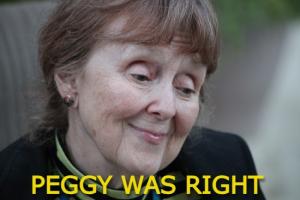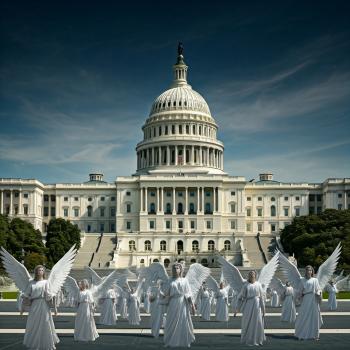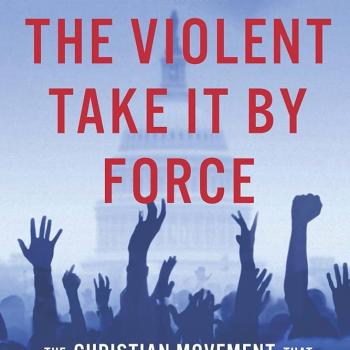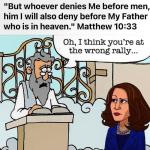Here’s a short lesson history lesson (and confession) sparked by a long-delayed, but perceptive book review by expat exvangelical blogger perfectnumber.
The book in question is Slaves, Women & Homosexuals: Exploring the Hermeneutics of Cultural Analysis, by William J. Webb. That title is a bit misleading, as the subtitle — the bit after the colon — is really the point here. Webb, a New Testament professor at Heritage Seminary in Ontario, is outlining his “redemptive movement” hermeneutic, an approach that seeks to consider the trajectory of biblical passages to make their meaning clearer for those of us reading them now, on the other side of the world, thousands of years later, in a wholly different cultural context.
 This isn’t a new invention or anything particularly unique or original, but Webb works to show that it can be a methodical approach that white evangelicals need not view with suspicion. Or, as perfectnumber notes, he sometimes works to show this. Because really, as she says, this is actually not a book about “slaves, women, and homosexuals.”
This isn’t a new invention or anything particularly unique or original, but Webb works to show that it can be a methodical approach that white evangelicals need not view with suspicion. Or, as perfectnumber notes, he sometimes works to show this. Because really, as she says, this is actually not a book about “slaves, women, and homosexuals.”
It was confusing for her to read the book and realize that, because that was how the book had been repeatedly recommended to her. It was suggested as a book that would carefully answer the question “what does the bible say about homosexuality?” That’s why she finally read it, more than a decade later, to see how it answered that question.
But she finds the book isn’t really interested in that question. Its discussion of the “issue of homosexuality”* is cursory and scarcely acknowledges, let alone engages, any perspective other than the mandatory, official white evangelical “stance” of absolute prohibition.
This leads her to form a theory as to what this book is actually about:
The way it reads to me is, he wants to write a book to make a biblical argument supporting egalitarianism. And it helps if he also discusses what the bible says about slavery- because we all agree slavery is wrong, and yet the bible allows it- so this is a good example to demonstrate that it’s valid to *not* agree with the “letter of the law” but to look for the “movement” behind it. Slavery is a “neutral example” which can prove to Christian patriarchists that hey, you guys don’t literally follow everything in the bible either, so you can’t just say “well the bible says” and automatically dismiss our arguments for women’s equality. And, if any of those patriarchists want to bring the criticism “well if we allow women and men to be equal, it’s a slippery slope to accepting homosexuality, and oh wouldn’t that be terrible if Christians accepted homosexuality”- that’s why the book also addresses “the homosexual issue”, and if to say “don’t worry, good evangelicals, equal rights for women DOESN’T mean we have to accept homosexuality.” It gives the egalitarian arguments in the book a lot more credibility, from an evangelical perspective, if the author also shows why those same arguments do NOT support gay rights.
Yep. That.
Webb is contending with white evangelicals who, for the most part, lack any coherent hermeneutic. Their defining approach to interpreting the Bible is to pretend it doesn’t require any interpretation. So they read every book like it’s the book of Proverbs, a collection of discrete aphorisms, admonitions, and commandments that can be plucked off the page and cited as The Authoritative Word Of God with which no other may dare to disagree.
Webb is taking on the anti-hermeneutic of clobber-texting concordance-ism. Specifically, he’s responding to the way a handful of clobber-text trump cards are deployed by white evangelicals to ensure that women are perpetually regarded as secondary and submissive. For centuries, white evangelical Christians in America defended slavery this same way, by concordance-ing up a stable of pro-slavery clobber-texts and deploying them to frame anyone who might be anti-slavery as anti-Bible and anti-God. Those supposedly definitive clobber-texts supporting slavery are all still there, but even “staunchest” conservatives and most ardent Defenders of the Authority of the Bible no longer treat them as compelling or binding or authoritative.
So Slaves, Women & Homosexuals starts with slavery because that establishes the possibility that clobber-texts may not be quite so indisputably authoritative after all. And then, as perfectnumber notes, it ends with an abstract discussion of the “issue of homosexuality” as a way saying yesbutofcourse some such clobber-texts are still authoritative so, fear not, we’re not just saying that anything goes.
This is why, as perfectnumber says, this book “is not about three things; it’s about one thing.”
In the foreword to the book, Darrell L. Bock explains the strategy here: “This book not only advances a discussion of the topics, but it also takes a markedly new direction toward establishing common ground where possible, potentially breaking down certain walls of hostility within the evangelical community.”
That sounds lovely — “establishing common ground” and “potentially breaking down certain walls of hostility.” It’s less lovely when you realize what this refers to — throwing LGBT people under the bus in the hopes that this will make patriarchal white Christians slightly more receptive to an argument for women’s equality.
The link for the book title up at the top of this post takes you to the website of CBE. Christians for Biblical Equality is a white evangelical organization that does terrific hermeneutic and exegetical work in support of women’s equality in the church and in society. This is excellent work and important work and CBE is very good at it.
But there’s also this: CBE’s website says the group was founded to do that in 1987. And that is not true.
The organization started in 1974 as the “Evangelical Women’s Caucus,” originally as a program of Evangelicals for Social Action. But that blew apart in 1986. That was the year that the same rigorous, painstaking exegetical and hermeneutical work led the devout biblical scholars of the Evangelical Women’s Caucus to produce a resolution stating this:
Whereas homosexual people are children of God, and because of the biblical mandate of Jesus Christ that we are all created equal in God’s sight, and in recognition of the presence of the lesbian minority in EWCI [Evangelical Women’s Caucus International], EWCI takes a firm stand in favor of civil rights protection for homosexual persons.
The ensuing freakout was cataclysmic, but it wasn’t conservative, patriarchal white evangelicals freaking out. The freakout was among “progressive,” “egalitarian” white evangelicals.
And it wasn’t due to the substance of that statement. The argument in favor of it was not refuted or even engaged. It was a matter of political calculation. Progressive evangelicals were freaking out in anticipation of how this would go over with the conservative, patriarchal types.
It was hard enough — almost impossible, really — to convince the mainstream gatekeepers of white evangelical patriarchy to be even slightly receptive to any challenge to their patriarchal assumptions. Years of painstaking, arduous work had been invested in establishing the EWC as a credible, respectable organization with legitimate “evangelical” bona fides. And now that was all going to be swept away by the admission that the group included lesbians and by this attempt to argue for their full dignity and equality as well? All that work in support of women’s equality was going to be wasted by this futile, sure-to-be-condemned attempt to expand the agenda.
It was, for some members of the EWC, inconceivable. And so they left the group and founded a new organization — Christians for Biblical Equality, confident that this new, unambiguous demonstration of their anti-LGBT credentials would shore up their perceived legitimacy with the target audience of white evangelical gatekeepers.
Let me be clear: the folks who flounced out of EWC over its affirmation of LGBT equality were not betraying their own principles in doing so. They were, at that time, wholly unconvinced that this affirmation was “biblical.” After all, just look at all those anti-gay clobber texts!
The irony of that — their own instinctive reversion to the very clobber-texting concordance-driven illiteracy they’d been working so hard against — ought to have given them pause. And the fact that they knew and had worked with that “lesbian minority” of the EWC for years, that they knew these women as friends and as people of integrity, ought to have made them take a breath and take a beat and listen to what these friends and colleagues were saying at least long enough to engage and evaluate their argument.
But the panic was too great. The wrath of the expected conservative condemnation of that resolution was all too predictable and the fear and frustration of seeing that wrath erase all of their hard work up to that point meant they really weren’t thinking clearly.
The survival of their work up until that point, and any hope for its future success, seemed possible only if this coming attack could be deflected. And so, a decade before the DLC coined the term, these “progressive” evangelicals embraced “triangulation.” They “established common ground” with anti-women evangelical leaders through their shared refusal to entertain any arguments for LGBT equality. And they hoped that this common ground might “potentially break down certain walls of hostility within the evangelical community” that was otherwise unwilling to entertain their own arguments for the equality of heterosexual women.
A great deal could be said about the dubious morality of this triangulation strategy and about the corrosive effect it has on its practitioners, the way it forces them to avoid certain questions, to actively evade certain lines of thinking or feeling or knowing and to swat them down every time they’d arise.
But since this progressive evangelical two-step is, primarily, a matter of political calculation, we should start by evaluating it on its own, purely practical and political terms. Does it work?
No. No it does not “work.” It does not help in any way to “break down certain walls of hostility.” It does not and did not make the gatekeepers of mainstream white evangelicalism any more receptive to CBE’s otherwise impeccable arguments for women’s equality.
After CBE and ESA rallied in 1986 to reject any suggestion of affirming LGBT equality their otherwise “progressive” advocacy still failed to gain any meaningful traction “within the evangelical community.” That was true in 1986 and in 1996 and it is true today.
“Injustice anywhere is a threat to justice everywhere,” the scripture says. That truth is not an invitation to political calculation, but it does have practical ramifications.
* Perfectnumber’s comment on this is worth repeating: “Evangelicals are always debating what the Bible says on this or that ‘issue’ — and it’s a very different thing if you are the ‘issue.'”
















